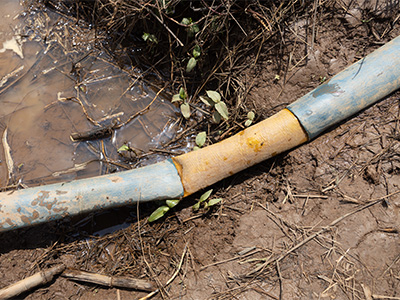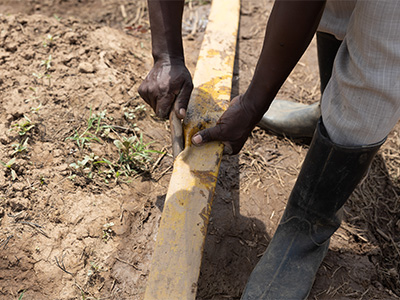One of the goals of the Daugherty Water for Food Global Institute is to understand different challenges farmers face while trying to adapt to using irrigation. The DWFI team has spent many hours speaking with farmers in the eastern part of Rwanda, particularly in Nyagatare and Bugesera districts.
One issue farmers had in common was how easily irrigation pipes break; most farmers expressed a lack of quality pipes. When we spoke with service providers, they acknowledged farmers' concerns, and explained that long-lasting pipes do in fact exist, but they are too expensive for farmers. Even though farmers face frequent pipe breakage, this hasn't stopped them from creating new ways to make pipes last longer.
In Nyagatare, some innovative farmers have developed a method of patching their pipes so that they can last longer. The team had a chance to talk in depth with an entrepreneur named Saratiel Sapu, a farmer and entrepreneur who provides irrigation-as-a-service in Nyagatare. Sapu extends a pipe's lifespan by patching the less damaged pipe with material from old damaged pipe. The patched pipe can last approximately 3 months longer than it was supposed to, which is significant for Sapu. He has even found several uses for his pipe, with the newest pipe being used for daily irrigation rentals and the oldest, patched pipe being used to fill dams for livestock. This allows him to service more farmers and generate more profit.

We also came across another innovative solution at a cooperative in Bugesera that farms in the marshland. DWFI had the opportunity to visit the cooperative while they were irrigating; their pipes were unlike any other pipes we had seen. While the brands were the same as the other farmers, their patching was noticeably different. The team saw that they put grass chunks inside the holes and added tree branch patches to keep the grass in place. For bigger holes, they patched with larger pieces of wood.
One farmer shared their motivation to get creative for making repairs:
“These pipes cost 50,000 Rwandan Francs. We couldn’t afford to replace them every year, and so we came up with a method to extend their lifespan. We currently have a pipe that has been working for three years and we intend to use it for even longer” a farmer said.

It’s amazing to see farmers with different approaches to mending irrigation pipes. One goal of the Institute is to build the capacity of smallholder farmers through mentoring, strengthening local innovation capacity, and connecting farmers from different areas to learn from each other. Disseminating knowledge of local innovations can help farmers to reduce their expenses when it comes to pipes. Visit https://waterforfood.nebraska.edu/entrepreneurship and read the report "Current state of irrigation-as-a-service in Rwanda" to learn more.

